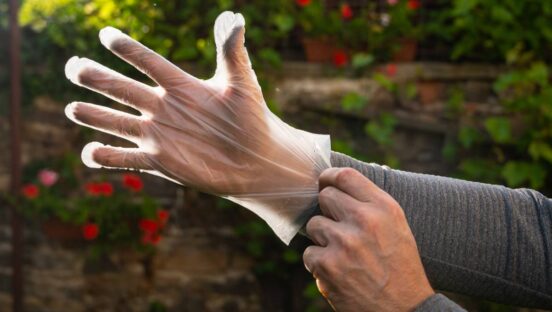Hairnet? Check. Gloves? Check. Pathogens? Potentially.
A freshly sealed box of gloves should mean that they’re uncontaminated, toxin-free, pathogen-free, and food-safe. While the restaurant, food handling, and manufacturing industries consistently push the importance of disposable gloves to ensure products and customers are protected, proprietary pathogen testing provided by glove distributor Eagle Protect has proven this isn’t always the case.
As the industry’s only B Corp certified PPE supplier, Eagle Protect has conducted its own proprietary research and independent testing of 26 brands of gloves. The preliminary results of their third-party analysis raised some important questions about the source of foodborne illness outbreaks in the industries that rely on disposable gloves: what if the food isn’t the source of contamination? Is it possible that pathogens that cause outbreaks could be occurring further back in the supply chain? Could this contamination actually be traced to PPE such as disposable gloves?
To conduct their proactive, third-party analysis of dozens of glove brands, Eagle Protect worked with the B. Michaels Group, led by Barry Michaels, who has more than 40 years of experience in the field of microbiology research. Through four years of rigorous research and analysis, the team presented the initial findings at the 2021 International Association of Food Protection (IAFP) conference. The results were nothing less than alarming.
In the testing of 26 different brands of new and unused disposable gloves, right out of freshly opened boxes, Eagle Protect found 50 percent had indications of human fecal contamination. In addition, traces of viable food-borne pathogens were identified, all of which represent a significant threat to public health, including:
- Listeria monocytogenes
- Staphylococcus aureus
- Streptococcus pneumoniae
- Bacillus anthracis (Anthrax)
If these pathogens are present on the exterior and interior of new and unused gloves, how are purchasers supposed to keep their customers safe if the specific products meant to prevent contamination are themselves contaminated? Eagle Protect dug deeper into the supply chain issue, noting that much of the contamination threat begins in the manufacturing and production stage. And a lack of stringent import testing requirements is allowing this threat to continue.
Unlike other industries, glove factories supplying the U.S. food industry specifically are not subjected to strict FDA monitoring. The FDA Food Code for disposable gloves (FDA Title 21, Part 177) doesn’t even include language that the gloves need to be intact, sanitary or be tested upon arrival in the U.S. With a lack of strict testing, a domino effect ensues and results in major recalls with financial ramifications. One particular study revealed that each food recall can cost a brand more than $10 million, to say nothing of the irreparable harm to their brand and reputation in the industry.
The most obvious solution, which has yet to be addressed, is to prevent cross-contamination at the manufacturing stage, long before they’re packaged, exported, and distributed to the end-users.
Eagle Protect encourages those who work within the food manufacturing and handling industries to conduct their own product research, sourcing disposable glove supplies from verified vendors and suppliers. Seeking vendors with high manufacturing standards, quality control measures, routine product audits, and a commitment to reducing the risk of cross-contamination in glove use can go a long way towards preventing the next foodborne illness outbreak.
Steve Ardagh, “The Glove Guy,” is the founder and CEO of Eagle Protect, a disposable glove supplier dedicated to the responsible sourcing of quality products that ensure customer safety and impact reduction, ultimately mitigating customers’ risk. Eagle Protect is the only global PPE supplier that is a Certified B Corporation, a designation that a business has met the highest standards of verified performance, accountability, and transparency. He can be reached at steve@eagleprotect.com.














